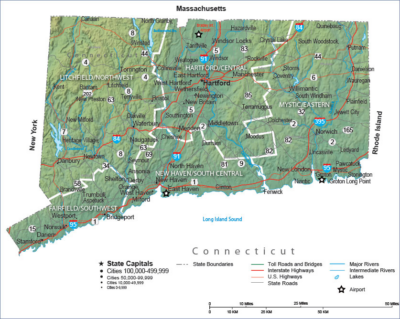
A new study out from the personal finance website WalletHub shows Connecticut property owners pay among the top three most real estate taxes with an average tax rate of 1.92%.
On a $303,400 property assessment, the average Nutmegger property owner pays $5,813 in real estate taxes, according to WalletHub. Of course, the average price of a home in Connecticut is much higher at between $404,162 and $450,000, according to Zillow. Annual taxes the state median home value of $343,200 is $6,575, according to WalletHub.
The top two highest taxed states are New Jersey, at No. 1, with 2.23% tax rate, or $6,770 on a property assessed at $303,400, and Illinois, at No. 2, with 2.07% tax rate, or $6,285 on a property assessed at $303,400.
The average American household spends $2,969 per year on real estate property taxes, according to the U.S. Census Bureau.
“Some states charge no property taxes at all, while others charge an arm and a leg,” said Chip Lupo, a WalletHub analyst. “Americans who are considering moving and want to maximize the amount of money they take home should take into account property tax rates, in addition to other financial factors like the overall cost of living, when deciding on a city.”
State politicians use the property tax issue as a “political football,” trying to score points with residents and property owners who they agree should pay a smaller burden of such taxes.
“Property taxes are crushing the budgets of Connecticut working class families and small businesses,” said state Republican Senate leaders Ryan Fazio and Stephen Harding. “Senate Republicans want to reduce taxes across the board and put a cap on property taxes in order to put $1,000 back in people’s pockets. Democrats mocked our tax relief ideas while offering none of their own.”
Democratic Gov. Ned Lamont this week told a gathering of Fairfield County business leaders that his administration continues what it can to reduce the amount of taxes paid by residents and businesses alike.
“We submitted a budget about 10 days ago,” Lamont said. “It would be our seventh and eighth balanced budget in a row (2026-2027), which is not where we were 10, 15 years ago. I hope it makes a difference for each and every one of you.
“At the same time, we have had about $500 million in tax cuts: that’s income tax cut, increasing the property tax credits, business tax cuts. We are doing everything we can to make sure you can continue to grow your business. You need some continuity. You need some predictability. And that’s something we haven’t had as a state for many years.”
Vehicle property taxes
Connecticut is one of only 26 states that tax vehicles owned by all residents and businesses. Among those states, Connecticut drivers pay the eighth highest vehicle property taxes in the country at an average of 2.11% per vehicle for a total of $605 per year, according to WalletHub. The highest tax rate is 3.97% paid by Virginia vehicle owners. In Connecticut, the amount of the tax depends on the National
Methodology
In order to determine the states with the highest and lowest property taxes, WalletHub compared the 50 states and the District of Columbia by using U.S. Census Bureau data to determine real-estate property tax rates and applying assumptions based on national auto-sales data to determine vehicle property tax rates.
For real-estate property tax rates, they divided the “median real-estate tax payment” by the “median home price” in each state. They then used the resulting rates to obtain the dollar amount paid as real-estate tax on a house worth $303,400, the median value for a home in the U.S. as of 2023 according to the Census Bureau.
For vehicle property tax rates, they examined data for cities and counties making up at least 50 percent of a given state’s population and extrapolated this to the state level using weighted averages based on population size. For each state, they assumed all residents own the same vehicle: a Toyota Camry LE four-door sedan — 2024’s highest-selling car — valued at $28,700, as of January 2025.



















